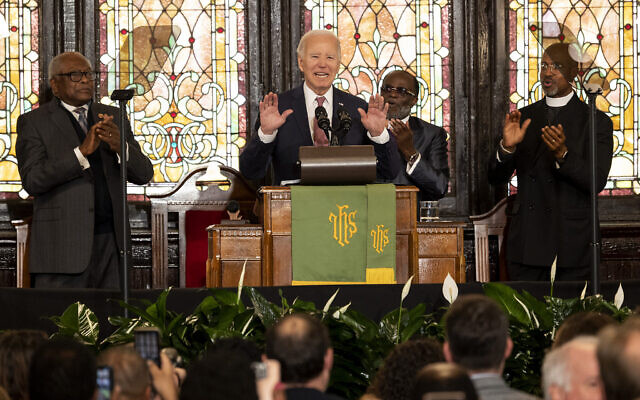



This Editor’s Note was sent out earlier Wednesday in ToI’s weekly update email to members of the Times of Israel Community. To receive these Editor’s Notes as they’re released, join the ToI Community here.
Almost 100 days after the horrors of October 7, almost 100 days into Israel’s consequent effort to dismantle Hamas, the war is proving as hard, bloody and complex as many had feared, and the context in which it is being fought more alarming than most had predicted.
Losses in the IDF are mounting inexorably, tearing at Israel’s soul, even as the troops themselves exude unity and fierce determination to dismantle the terrorist army that slaughtered our people in their homes and communities. The death of six soldiers Monday, when IDF tank fire at an enemy target inadvertently detonated explosives primed to destroy a Hamas tunnel, was only the latest in a long stream of terrible incidents of self-inflicted harm — a near-inevitable consequence of this kind of urban warfare, but the kind of tragic loss that only exacerbates the pain.
Half of Hamas’s 24 battalions are no longer functional, we are told, and perhaps a third of its gunmen have been killed. But the fighting in Khan Younis, where many believe Yahya Sinwar and his Hamas leadership colleagues are hiding out, reportedly surrounded by some of the hostages, would seem to have hardly begun. And it is not clear how Israel plans to tackle Hamas in densely populated Rafah, at the foot of the Strip, or how it is coordinating with Egypt, if at all, to prevent Hamas leaders fleeing Gaza and potentially taking hostages with them, and to stop Hamas rearming through that border, via tunnels or otherwise.
The IDF and its political commanders keep saying that the war will go on throughout 2024, at varying levels of intensity and with varying levels of ground force deployment. Almost the entire international community, and most world public opinion, has been calling for a ceasefire from the very start of the Israeli response. Thursday sees the launch of a South Africa-driven bid, bolstered by the spectacularly damaging remarks of numerous members of the Israeli government, to have the International Court of Justice start the process of seeking to impose one.
And only the United States continues to block the ceasefire pressure, while also providing Israel with the practical means — that is, the weaponry — to continue the campaign.
But the US is not providing Israel with a carte blanche.
On his trip here just a few days after Hamas’s October 7 massacres, with the full savagery of the terrorists’ exultant Jew-killing atrocities yet to be widely understood, US President Joe Biden vowed to stand by Israel forever, and to “do everything in our power” to make sure it would “again be a safe place for the Jewish people.” In that same October 18 speech, however, Biden also implored Israel not to be “consumed” by the rage it felt. Israel’s wartime decisions, like all wartime decisions, he cautioned, would require careful deliberation, hard questions, “clarity about the objectives and an honest assessment about whether the path you are on will achieve those objectives.”
Facing hecklers in a church on Monday who demanded a “ceasefire now,” Biden, unscripted, responded: “I’ve been quietly working with the Israeli government to get them to reduce and significantly get out of Gaza.” Only he knows precisely what he meant by that ambivalent construction, but it was certainly not a ringing endorsement of the nature of the ongoing IDF campaign.
Biden has made plain his heartfelt support for Israel on innumerable occasions, and made plain, too, almost as often, his differences with Prime Minister Benjamin Netanyahu. As he said at a campaign event at the White House last month, “Bibi and I talk a lot. I’ve known him for 50 years. Some of you know he has a picture on his desk… where I wrote…, ‘Bibi, I love you, but I don’t agree with a damn thing you have to say.’ That remains to be the case. He’s a good friend, but I think he has to change and — with this government. This government in Israel is making it very difficult for him to move.”
And as Secretary of State Antony Blinken indicated fairly clearly during his Tel Aviv press conference on Tuesday night, the administration’s patience with Israel’s leadership is running low, and its conviction that the hardline coalition is mishandling the war and harming Israel’s long-term interests is deepening.
As he has done publicly on previous visits, Blinken asserted that the IDF has been causing unnecessarily high civilian casualties, even as he acknowledged the challenges of fighting a terrorist army that hides behind noncombatants and fires from mosques and schools. “The daily toll on civilians in Gaza, particularly on children, is far too high,” Blinken said, while the State Department quoted him telling Netanyahu in their meeting earlier to avoid “further civilian harm” — a requirement which, if followed, would mean Israel could not actually fight the war at all.
Still, Blinken assessed that Israel has “achieved significant progress” toward what he called its “fundamental objective” of “ensuring that October 7th can never be repeated.” And, having reportedly told Israeli leaders during a late November visit that Israel likely does not have months to complete the military campaign, he gave no indication that the US was setting timelines or deadlines for the war.
On issue after issue, however, Blinken set out positions deeply and sometimes fundamentally at odds with those of Netanyahu and/or many of his ministers.
He all but accused the government of theft in failing to transfer to the Palestinian Authority the full tax revenues Israel collects on the PA’s behalf, monies that Finance Minister Bezalel Smotrich refuses to hand over, in part because of the PA’s payments to terrorists and their families: “These are their revenues,” Blinken said of the PA. “They should have them.”
Where Netanyahu insistently lumps the PA together with Hamas as enemies of Israel committed to its destruction, the secretary hailed the PA security forces for their work in “trying to keep peace, security, and stability in the West Bank – something that’s profoundly in Israel’s interest.”
While the Israeli Foreign Ministry has reportedly drawn up a plan aimed at pushing the UN’s Relief and Works Agency (UNRWA) out of Gaza, because of its hostility to Israel and alleged cooperation with Hamas, Blinken talked up the UN’s “indispensable role in addressing the immense humanitarian needs in Gaza,” and added pointedly, “There is simply no alternative.”
During his meetings, Blinken said, he had reached an agreement with his Israeli hosts for the UN to “carry out an assessment mission” to northern Gaza, “to determine what needs to be done to allow displaced Palestinians to return safely to homes in the north.” One can imagine how reluctant Netanyahu would have been to sanction such a “mission,” and well understand why the two men opted not to issue joint public statements and why the PMO did not even provide a readout of their talks.
Blinken detailed at length what amounts to the Biden administration’s strategy for Israel’s long-term survival — and it stands in utter contrast to the Netanyahu approach
He also sought to constrain at least some in the coalition by explicitly rejecting any advocacy for resettling Gazans outside the Strip and said Netanyahu stressed this is not Israeli policy. And he spoke of “working with Israel to find a diplomatic solution that avoids escalation in the north,” thus trying to finesse those in the Israeli leadership who advocate a potent military offensive against Hezbollah.
Most fundamentally, however, Blinken detailed at length what amounts to the Biden administration’s strategy for Israel’s long-term survival — and it stands in utter contrast to the Netanyahu approach.
The prime minister adamantly opposes Palestinian statehood, and had until October 6 claimed vindication for a strategy of normalizing relations with nations in the region, with the assertion that this would ultimately compel the Palestinians to realize they were being left behind, lower their demands and enable an accommodation. Blinken declared his and the US government’s unequivocal conviction that this could not work, and manifestly has not worked.
It’s worth quoting that passage of his prepared remarks at length, because it is so definitive a position, and so contrary to the stance of Israel’s governing coalition and its prime minister:
“Finally, we continue to discuss how to build a more durable peace and security for Israel within the region. As I told the prime minister, every partner that I met on this trip said that they’re ready to support a lasting solution that ends the long-running cycle of violence and ensures Israel’s security. But they underscored that this can only come through a regional approach that includes a pathway to a Palestinian state,” said Blinken.
“These goals are attainable, but only if they’re pursued together. This crisis has clarified you can’t have one without the other, and you can’t achieve either goal without an integrated regional approach. To make this possible, Israel must be a partner to Palestinian leaders who are willing to lead their people in living side by side in peace with Israel and as neighbors. And Israel must stop taking steps that undercut Palestinians’ ability to govern themselves effectively.”
Those extreme differences of approach — between Israel’s hardest-line government ever, and a US administration whose diplomatic and practical support are essential to Israel’s capacity to dismantle Hamas — are now exposed in full public view. And they seem utterly unreconcilable, precisely, as Blinken said, “when the stakes are highest, when the choices matter the most.”
For Blinken, this “crisis has clarified” that there can be no peace and security for Israel without a Palestinian diplomatic horizon and eventual Palestinian statehood. For Netanyahu and his government, it has demonstrated the absolute opposite — that Palestinian hostility to Israel is absolute, insatiable, and even more monstrous than it had conceived.
Much of the international community would appear to be indifferent or worse to Israel’s need for peace and security. And much of the Israeli public, while alienated from its government, is probably as far away as it has ever been from a willingness to partner with the Palestinians.






